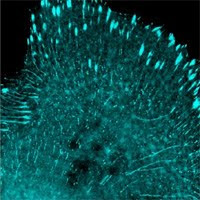This is the first part of a series of blogs about using fluorescent proteins in cell based assays with established examples, a common theme here at the AlleleBlog.
FUCCI Cell Cycle Sensor
The FUCCI Cell Cycle Sensor is composed of a red (RFP) and a green (GFP) fluorescent protein fused to different regulators of the cell cycle: cdt1 and geminin.
During the cell cycle, these two proteins are ubiquitinated at different time points by specific ubiquitin E3 ligases, which tag them for degradation in the proteasome. The E3 ligases’ activities are regulated temporally and result in the biphasic cycling of GERMINI and CDT1 levels during the cell cycle. In the G1 phase of the cell cycle, GERMINI is degraded; therefore, only CDT1 tagged with RFP is present and appears as red fluorescence within the nuclei. In the S, G2, and M phases, CDT1 is degraded; only GERMINI tagged with GFP is present, resulting in cells with green fluorescent nuclei.
During the G1/S transition, when CDT1 levels are decreasing and GERMINI levels increasing, both proteins are present, so are the tagged fluorescent proteins. When the green and red images are overlaid, nuclei fluoresce yellow. This dynamic color change, from red-to-yellow-to-green, represents the entire cell cycle. This representation can be used to study the effects of elements that may influence cell cycles.
Sakaue-Sawano A, Kurokawa H, Morimura T, Hanyu A, Hama H, Osawa H, Kashiwagi S, Fukami K, Miyata T, Miyoshi H, Imamura T, Ogawa M, Masai H, Miyawaki A.Visualizing spatiotemporal dynamics of multicellular cell-cycle progression. Cell. 2008 Feb 8;132(3):487-98.CCNB1-CyclinB(NT)-GFP
In late S phage, CCNB1 promoter will be switched on to drive the expression of Cyclin B N-terminus-GFP expression; thereafter the fluorescent signal will be switched off at the destruction box in Cyclin B N-terminus at the end of Mitosis phase. During the intervening phase the fusion reporter protein will translocate from cytoplasm to nucleus by the cytoplasmic retention signal in the Cyclin B N-terminus.
Thomas N. Lighting the circle of life: fluorescent sensors for covert surveillance of the cell cycle. Cell Cycle. 2003 Nov-Dec;2(6):545-9. GFP-PCNA/YFP-PCNA
GFP-PCNA, a fusion of GFP and PCNA, has been widely used as a convenient tool to monitor the progress of S phase. At the onset of S phase, GFP-PCNA translocates into the nucleus; at mitosis the nuclear envelope breaks down and the nuclear accumulation of PCNA-GFP dissipates.
GFP-PCNA, a fusion of GFP and PCNA, has been widely used as a convenient tool to monitor the progress of S phase. At the onset of S phase, GFP-PCNA translocates into the nucleus; at mitosis the nuclear envelope breaks down and the nuclear accumulation of PCNA-GFP dissipates.
- New Product of the Week 102510-103110:
- Promotion of the Week 102510-103110:



